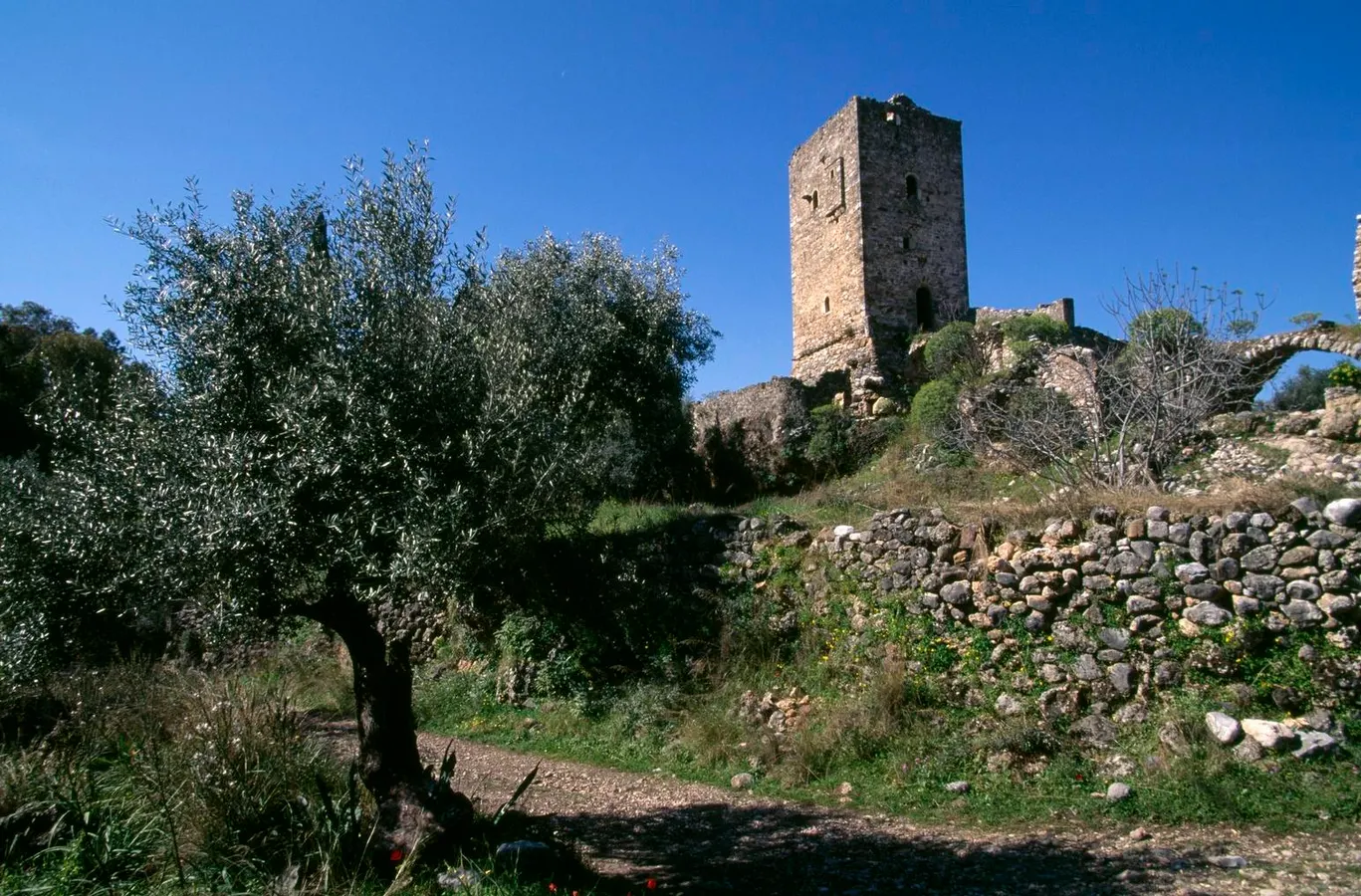By Contributor,Daniel Scheffler
Copyright forbes

Messinia has always been about the land. Sun, sea and soil have shaped a cuisine that is simple yet abundant, humble yet alive: olives hanging heavy on silvery branches, citrus spilling its perfume across the air, figs sun-dried until their sweetness hums, wild greens tucked into every village table, fresh fish glinting on ice like polished bronze, cheeses that carry the tang of the hills and the salt of the wind. Walk through a village market and the centuries press softly beneath your feet; the rhythm of generations pulses in the rows of produce, the tilt of baskets, the soft chatter of hands that have known soil and fire for decades. Messinia’s food culture is not flashy—it is elemental, seasonal, alive. It’s Greece, quintessentially.
GREECE – AUGUST 24: Mourtzinos tower in Kardamyli, Peloponnese, Greece. (Photo by DeAgostini/Getty Images)
De Agostini via Getty Images
I’ve been traveling to Greece for over 40 years, never repeating the same place, always discovering a new island, a new village, a hidden corner, and always finding something marvelous, ancient, and inspiring. Greece feels like home to me, even though I am not any percent Greek—turns out I was misinformed. Still, I relate to the land, the rhythms of life here, and the old, old, old culture that has shaped everything from olives to architecture to the stories that linger in the hills and seas.
Its history runs deep. Skewered meat, the ancestor of today’s souvlaki, was already part of Homeric feasts in the Kingdom of Nestor, where wine flowed as freely as stories. Homer himself praised the olive oil of this land, and wandering Messinia today, you can feel the same force: hills, sea and groves holding a measured, enduring beauty, the sun catching silver leaves like flashes of shields in a long-forgotten battle. Kalamata olives, sun-dried figs, semi-hard Sfela cheese, Poliani apples—these are not merely ingredients; they are memory, carried forward in hands that honor them. Together with wheat, olive oil and wine—the Mediterranean triad—they form the backbone of Messinia’s cuisine. Local specialties like slow-cooked lalanghia speak of fire, patience, and hands that know the rhythm of centuries.
Messinia boasts an incredibly long history of olive grove cultivation, dating back to the Mycenaean era (12th century BC), with evidence found in Nestor’s palace.
Cristina Stribacu
Greece’s Olive Oil That Tastes Of The Land
Olive oil is the heartbeat here. Navarino Icons ELEON, from the groves around Costa Navarino, is what chefs reach for when they want the sharp, peppery punch only a Koroneiki olive can deliver. I tasted it straight from the bottle and it stopped me: bright, herbal, with a heat that lingers and a fruitiness that spreads slowly like sunlight across a hillside, leaving the memory of grove and earth behind. These trees have been nurtured for decades, some even centuries, each drop tasting of history, sun and labor. Messinia produces roughly 50,000 tonnes of olive oil a year, most extra virgin, from some 15 million trees. Harvest runs from October to February, and the first cold-pressed oils are prized for clarity, intensity and whisper of the land.
ELEON is made exclusively from single variety olives, the acclaimed Koroneiki variety, grown in the seaside groves of Costa Navarino
Costa Navarino
The harvest itself has its own rhythm. I drove up a narrow hill track outside Kalamata and joined a family in their grove. Nets were spread beneath silvered trees, olives dropping like dark moons. Children dashed between the rows, snatching rogue fruit, while adults moved with calm, practiced motion, shaking branches, gathering, sorting. The air smelled of earth and leaves, sun-warmed olives and the faint smoke of a distant fire. I plucked one and bit into it—bitter, rich, alive—and for a moment, the centuries of hands that had done this before seemed to pulse beneath mine.
Nearby, Christopher Nolan’s upcoming film, The Odyssey, was being shot. Methoni Castle, Voidokilia Beach, and the archaeological site of Nestor’s Palace were active filming locations, the crew capturing the same sunlit hills and olive groves I was walking through. It was striking to see epic storytelling happening alongside daily labor—the olive harvest and the movie unfolding on the same land.
It was simple, unassuming, perfect in its rhythm. Just the way I travel, always discovering new corners, new tastes, new stories.
Book an olive oil tasting when you arrive in the region, it will explain the history in a way that will lightened up your heart.
Konstantinos Sofikitis
Greece’s Voice From The Groves
Cristina Stribacu, who grew up among olive groves in Filiatra, carries Messinia’s story in her hands. Her parents began with just 19 olive trees in 1975, and today she and her brother Konstantinos tend to more than 3,000 Koroneiki trees. She is the founder of LIÁ Extra Virgin olive oil based here in Messinia.
Cristina Stribakos harvests the fruit of their trees and produce the purest extra virgin olive oil, combining the wisdom of the past with the innovation of the future, with ethos, authenticity, respect and love for the people and nature around them.
Konstantinos Sofikitis
“As a child, the olive trees were my playground—my kingdom. I remember those long summer days on our farm, lying under the trees at midday, half-closing my eyes to watch the silver-green leaves play with the light, lulled by the rustle of branches, lost in my daydreams,” shares Cristina. “After the siesta, my favorite treat was waiting for me: a big slice of homemade bread with grated tomato, fresh oregano, sea salt (afrala) and our extra virgin olive oil. Even today, that remains my comfort food. It doesn’t just fill the stomach—it goes straight to the heart.”
Cristina describes her mornings in sensory detail: dew on the groves, the sound of leaves, the smell of soil after rain. “In the olive grove, the smallest details matter—the biodiversity, the soil, the pruning, the green fruits, and above all, the people. Each detail shapes the flavor of the oil,” she adds. For me, extra virgin olive oil is not just a product, not just a fat in the kitchen. It is the epitome of farming as an art and the soul of gastronomy: the ingredient that connects flavors and people, and the most honest, healthy, and sustainable oil you can choose.
Messinia’s food isn’t just cuisine. Each olive, each branch carries memory, and that memory pours into the oil—bright, green, alive. For me, after decades of travel, this is why Greece feels like home.
Greece’s Markets That Carry History
Messinia’s markets have the same grounded energy. I wandered through Kalamata’s central market one morning, sun bouncing off the tiled streets, and watched vendors lay out figs, oregano and mountain tea from Taygetos Mountain and olives as if offering them to the gods. Women bundled herbs like green torches, the scent of fresh citrus mingling with the brine of olives. Stall owners greeted regulars by name, passing over figs and olives with practiced ease. Every piece of this was alive with history, a working rhythm that explained why the food here tastes rooted and essential.
Even after decades of exploring Greece, these markets never fail to impress—each table, each scent, each person a living thread connecting the present to centuries past.
Greece’s Chefs Rewriting The Story
Chefs have long shaped how Messinia’s cuisine evolves. Nikolaos Tselementes, writing in the early 20th century, introduced French techniques to Greek kitchens, refining recipes and teaching all kinds of magic. Today, Chrysanthos Karamolegkos carries that spirit forward, blending traditional flavors with modern finesse at Anama Restaurant in Gialova. At Costa Navarino, Giannis Georgousopoulos, Joris Larigaldie and Nikos Billis are quietly rewriting the story of the region.
Nikos Billis, Executive Chef at W Costa Navarino, pairs local goat’s cheese with fresh tomatoes or plates of sea urchin atop a crisp that could belong in the finest kitchens as much as in Kalamata. His vision is to make the beef heart tomato, the hontrokatsari, great again, with a philosophy of respect for tradition, seasonality, purity—and removing every unnecessary element.
W Costa Navarino is nestled next to the fishing village of Gialova on the unspoilt shoreline of Messinia, in the southwest Peloponnese
Costa Navarino
Joris Larigaldie, Cluster Director of Culinary Strategy and Operations at Costa Navarino, ensures every dish, from casual to elaborate, speaks to the land and history while quietly surprising your palate. “Too often we present icons—a mezze platter, a Greek salad—while the true richness lies in the stories: why a dish came to be, why it endures, why a spice carries meaning across centuries of trade. These narratives bind land, season, and culture to the plate, embodying the essence of gastroanthropology: food as nourishment, but also as memory, migration, and values,” Joris said.
Cristina echoes this sentiment from outside the resort kitchens: “Chefs translate tradition, seasonality, and memory onto the plate. For me, it all begins earlier, in the grove. The roots of bliss are in the soil, where memory, scent, and flavor are born. Each drop of extra virgin olive oil carries the intimacy of family and the generosity of Messinian land. It is not just nourishment, but a thread that binds us to place and to each other—it carries with it memory, place, and a sense of belonging.
In villages, young cooks and taverna owners experiment with ingredients they grew up with—local honey, fresh herbs, sun-dried tomatoes—without losing sight of where they came from. You see it in a table set outside a whitewashed house, in a tomato salad glistening with olive oil, in a slow-cooked leg of lamb that tastes of earth, sun and centuries. At a small village taverna, I tasted fried sardines drizzled with olive oil and sprinkled with fresh oregano. Simple bliss.
Even after decades of travel, moments like this explain why I keep returning.
Greece’s Landscape, History, And The Sea
The region itself is breathtaking. Hills dotted with whitewashed villages tumble down to the Ionian and Messenian seas. Ruins of Mycenaean fortresses and Venetian castles whisper stories of centuries past, while the Palace of Nestor anchors Messinia in epic history. Nature is everywhere: olive groves stretch to the horizon, wild herbs scent the air, and beaches—from sandy Voidokilia to rocky Finikounda—frame the land with a deliberate, considered beauty.
The sea adds its own rhythm. In Pylos and Methoni, the catch of the day glimmered in the morning sun—mackerel, sardines, squid, glistening like jewels—and chefs treated each fish with care, slicing, seasoning and grilling as if each were a small story. At Costa Navarino, a reinterpretation of sea urchin at Barbouni restaurant at The Dunes Beach was startling in its simplicity, the brine and sweetness pairing perfectly.
Later, I strolled to an olive grove near the coast, olives dangling like tiny moons from silvery branches, and then sat at a local taverna to taste a meal that made me feel like I was tracing history on a plate. Each dish was a story of Greece, each flavor a memory, each bite a note in an epic quietly sung across centuries. Messinia’s food isn’t just sustenance—it’s history, creativity, and place.
Editorial StandardsReprints & Permissions



